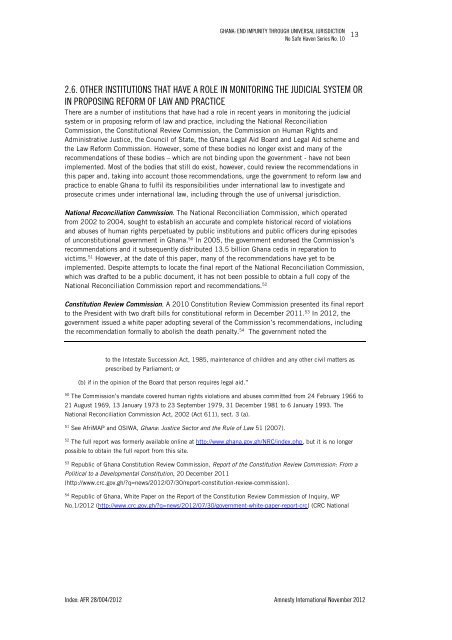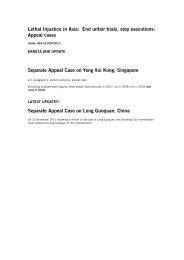Ghana - Amnesty International
Ghana - Amnesty International
Ghana - Amnesty International
Create successful ePaper yourself
Turn your PDF publications into a flip-book with our unique Google optimized e-Paper software.
GHANA: END IMPUNITY THROUGH UNIVERSAL JURISDICTIONNo Safe Haven Series No. 10132.6. OTHER INSTITUTIONS THAT HAVE A ROLE IN MONITORING THE JUDICIAL SYSTEM ORIN PROPOSING REFORM OF LAW AND PRACTICEThere are a number of institutions that have had a role in recent years in monitoring the judicialsystem or in proposing reform of law and practice, including the National ReconciliationCommission, the Constitutional Review Commission, the Commission on Human Rights andAdministrative Justice, the Council of State, the <strong>Ghana</strong> Legal Aid Board and Legal Aid scheme andthe Law Reform Commission. However, some of these bodies no longer exist and many of therecommendations of these bodies – which are not binding upon the government - have not beenimplemented. Most of the bodies that still do exist, however, could review the recommendations inthis paper and, taking into account those recommendations, urge the government to reform law andpractice to enable <strong>Ghana</strong> to fulfil its responsibilities under international law to investigate andprosecute crimes under international law, including through the use of universal jurisdiction.National Reconciliation Commission. The National Reconciliation Commission, which operatedfrom 2002 to 2004, sought to establish an accurate and complete historical record of violationsand abuses of human rights perpetuated by public institutions and public officers during episodesof unconstitutional government in <strong>Ghana</strong>. 50 In 2005, the government endorsed the Commission’srecommendations and it subsequently distributed 13.5 billion <strong>Ghana</strong> cedis in reparation tovictims. 51 However, at the date of this paper, many of the recommendations have yet to beimplemented. Despite attempts to locate the final report of the National Reconciliation Commission,which was drafted to be a public document, it has not been possible to obtain a full copy of theNational Reconciliation Commission report and recommendations. 52Constitution Review Commission. A 2010 Constitution Review Commission presented its final reportto the President with two draft bills for constitutional reform in December 2011. 53 In 2012, thegovernment issued a white paper adopting several of the Commission’s recommendations, includingthe recommendation formally to abolish the death penalty. 54 The government noted theto the Intestate Succession Act, 1985, maintenance of children and any other civil matters asprescribed by Parliament; or(b) if in the opinion of the Board that person requires legal aid.”50The Commission’s mandate covered human rights violations and abuses committed from 24 February 1966 to21 August 1969, 13 January 1973 to 23 September 1979, 31 December 1981 to 6 January 1993. TheNational Reconciliation Commission Act, 2002 (Act 611), sect. 3 (a).51See AfriMAP and OSIWA, <strong>Ghana</strong>: Justice Sector and the Rule of Law 51 (2007).52The full report was formerly available online at http://www.ghana.gov.gh/NRC/index.php, but it is no longerpossible to obtain the full report from this site.53Republic of <strong>Ghana</strong> Constitution Review Commission, Report of the Constitution Review Commission: From aPolitical to a Developmental Constitution, 20 December 2011(http://www.crc.gov.gh/?q=news/2012/07/30/report-constitution-review-commission).54Republic of <strong>Ghana</strong>, White Paper on the Report of the Constitution Review Commission of Inquiry, WPNo.1/2012 (http://www.crc.gov.gh/?q=news/2012/07/30/government-white-paper-report-crc) (CRC NationalIndex: AFR 28/004/2012 <strong>Amnesty</strong> <strong>International</strong> November 2012
















